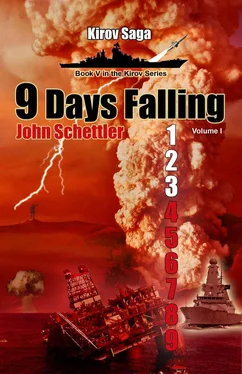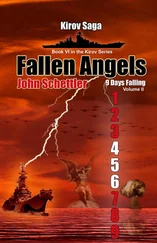Salase brushed a crumb of bread from his lips, eyes wandering as he spoke. “A familiar route,” he began. “It’s why your company is just the perfect carrier—”
“Where?” She let just a little impatience enter her tone.
“The Royal Vopak’s Banyan Terminal in Singapore.” He said it quickly, taking a sip of wine and watching her over the rim of the glass as he finished. For the first time tonight, he thought, I have my hand up the prissy little lady’s skirt—if she would but wear a skirt. She walks about in trousers and thinks it fashionable. Women in business! What is the world coming to? His smile betrayed nothing of his thoughts as he set down the wine glass.
“Singapore?” She gave MacRae a quick glance. “You mean to tell me the Americans are in a tizzy with this hurricane Victor business shutting down all their refining capacity, and they want to move the oil to Singapore?”
“Strictly business,” said Salase. We arranged a buyer in Tokyo, and they’re offering a premium price. The Japanese are very cash rich these days. They can out bid virtually anyone on the Western market when they choose. And it appears this is such a time. This business with the Chinese has them justifiably worried.”
“I see…” Fairchild gave herself a moment to digest this news, a bit angry that her own people didn’t have the information, the name of the buyer, the destination port, or any of this latest twist in the offer. Here she thought she would be hauling to the Vopak terminals at Deer Park and Galena on the Texas coast. That route through the Med and across the Atlantic would be much safer.
“The almighty dollar,” she breathed, “such as it is these days. I suppose Royal Dutch Shell is in thick as thieves on this deal.” Vopak was a large independent Dutch tank terminal operator, with 78 locations in over thirty countries. They had a venerable history, dating back to 1616 when groups of weighmasters and porters began offering weighing, sorting and storage services at Dutch harbors for the cargo shipped in by the East India Trading Company. In fact, they had received and stored the very first shipment of oil to the Netherlands, in 1862, and proudly displayed a photo of the event on their web site.
“Of course,” Salase dropped any semblance of pretense now. “It has always been about dollars, or the gold that buys them.” It was time for the close. “So what would you like to do?” He waited, knowing that the person who spoke next would come out on the losing end of the deal. The English bitch would most likely have many more considerations, which he had all anticipated before he landed here tonight. There would be mileage, hazardous waters, known piracy zone surcharge, not to mention that she was obviously trying to extricate herself from many of the waterways her precious tankers would now have to travel en route to Singapore.
But Salase knew she could only make good on 60% of the big loan reimbursement Bank of London was calling in next month, and that was assuming her precious Princess Royal made it safely through the straits of Hormuz. The company badly needed the other 40% on that credit rollover, another $300 million dollars. With everything in the States shutting down for Hurricane Victor, there would be ample business there for emergency shipments. Perhaps she could get $150 a barrel for the cargo Princess Royal held and sell it to the Americans. She would still need another $250 million to cover her loans. Warships were expensive, no matter what color you painted them or how well your hid the guns and missiles.
The Atlantic would probably heat up very soon. Shipping orders were starting to come in at any of a number of big European ports. But the cargo they needed to deliver was nowhere at hand. Fairchild was well ahead of the game, with good shipping capacity four days south of a very motivated producer right now.
Fairchild needed the deal, and Salase knew she could see the obvious advantages of what he was offering her. He would work it so that she would stand to earn at least $125 million on this caper, and that would get her just a little closer to solvency when she sat down with her bankers next month, assuming she would still be able to walk after the good hard fucking he was about to give her in these negotiations. Salase had information that would soon change the math yet again. In a few days she could get $75 dollars a barrel for mere conveyance on this deal, but he would lock her in here for fifty, perhaps fifty-five all said and done. Yes, he had his hand up her skirt now, in a manner of speaking, and in a minute he would have her legs open as well.
“I’ll need another two dollars for mileage,” she began predictably, and he knew he was going to close the deal. “That’s through the Red Sea, round the Somali coast, which is a known piracy zone, and across the Indian Ocean to more of the same in the Straits of Malacca—very dangerous waters these days.”
“To be sure, but you’ll have to assume some risk in the venture. “
“For another three dollars on top of mileage,” she said flatly, folding her hands on the table.
“Lord almighty,” he breathed. “We have already discussed a ten dollar risk premium.”
“That was for the Bosporus-Black Sea leg, an imminent war zone.”
“I’m losing all my profit!” He was lying, of course, and he knew that she was well aware of that fact, but these matters had a certain choreography about them, and he was expected to make some protest at this point, which he did. “That will come out to fifty-five dollars a barrel for mere conveyance against a current barrel price of only $145,” he said, trying to sound distressed.
“Done,” said Fairchild. “Providing Captain MacRae sees no undue security risk that would preclude our operations in the waters described.” She gave him a quick look, knowing what his response would be.
“We’ll handle the situation well enough, I suppose,” he said with that lovely Scottish accent. “Unless things take a severe turn for the worse in the next week.”
“Very well,” Fairchild was ready to move on to dinner. “I suppose you brought contracts?”
“Well, this is all very sudden,” said Salase. “I was hoping for forty a barrel but—”
“Fifty-five, and if we run into any trouble, at either end or any time while we’re in transit, you pay any cost that isn’t reimbursed by the insurance carrier.”
“But—”
“And if, by any God forsaken stretch we should lose a ship on this little venture, then we collect double over insurance premiums. That’s a long term loss, and the insurance will hardly compensate me for revenue shortfall until I could replace the vessel.”
The little bitch thinks she has me by the balls, he thought, secretly amused. Now it was time for the final act. “Well…” he hesitated just long enough, appearing flustered and cleverly using his napkin to dab his brow, but he knew he had her legs open now, figuratively speaking. He had planned to give her fifty dollars a barrel, and by god that’s exactly how it played out, aside from the minor annoyance of that last five dollars for fuel and piracy premiums.
“You drive a very hard bargain,” he said. “Alright, you need fifty-five, I’ll close for that, but not a dollar more.” He extended a hand, with a sinister grin on his face. “Deal?”
“Done,” she said, shaking on it. Fairchild was disgusted by the man, presuming he could come in here and dicker with her on conveyance and security charges for an operation like this. The little surprise on the terminal destination cost her a step in the dance, but she had made a good recovery, pushing him up another five dollars a barrel, when she might have settled at fifty under normal circumstances.
Читать дальше












